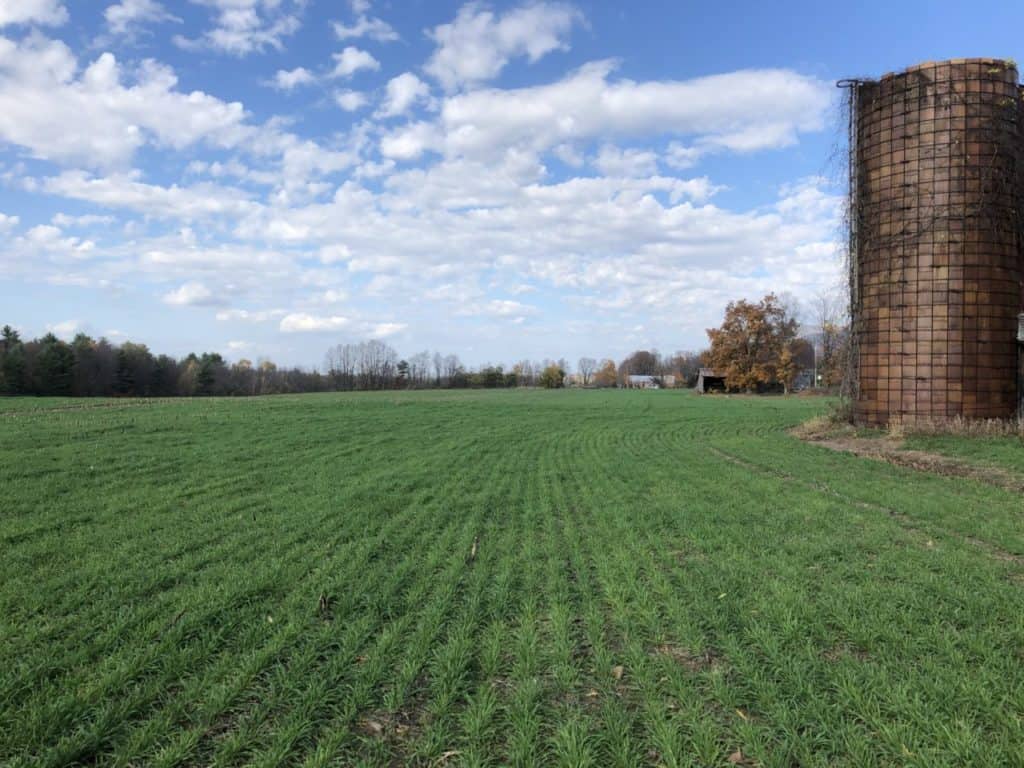 The Vermont Agricultural Water Quality Partnership (VAWQP) released its 2020 annual report highlighting the impacts of state and federal investments toward protecting and improving water quality on March 5. The VAWQP report shares conservation practice implementation data which indicates a high level of commitment from Vermont farmers in land stewardship.
The Vermont Agricultural Water Quality Partnership (VAWQP) released its 2020 annual report highlighting the impacts of state and federal investments toward protecting and improving water quality on March 5. The VAWQP report shares conservation practice implementation data which indicates a high level of commitment from Vermont farmers in land stewardship.
For example, in 2020, conservation efforts by farmers helped reduce erosion, improve soil health, and protect water quality. Over 28% of the annual cropland in Vermont was cover cropped (26,748 acres) and conservation tillage was implemented on 15% of annual cropland (14,305 acres). Conservation tillage means that 30 percent or more of the soil surface is covered with crop residue, after planting, to reduce soil erosion by water.
“The most recent conservation data for progress on farms throughout the state is very encouraging when you consider the fact that agriculture contributed 96 percent of total reported phosphorus reductions for Vermont, across all land use sectors,” said VAWQP coordinator Alli Lewis. These meaningful gains in water quality improvement on farms were reflected in the recent Clean Water Initiative Performance (CWIP) report, published by the VT Department of Environmental Conservation (DEC).
The CWIP report summarizes how Vermont’s $194 million investment in water quality over the past five years is paying off by improving water quality in Vermont’s rivers, lakes, and wetlands. This report shares that thirteen percent of the Lake Champlain Basin Total Maximum Daily Load (TMDL) required phosphorus reductions have already been met through clean water programs. Estimated phosphorus load reduction from the agricultural sector in 2020 was estimated at 27.1 metric tons, which includes results of farmers participating in USDA Farm Bill programs, as well as technical assistance and regulatory program results such as the VT Agency of Ag, Food, and Markets production area compliance.
The VAWQP reports that in 2020, $28.2 million was invested by state and federal entities to implement agricultural water quality projects. State and federal assistance helped farmers install practices like crop rotations, manure injection, reduced tillage and cover crops, and riparian forested and grass buffers. In addition to conservation implemented on farms throughout Vermont, 200 acres of wetlands were protected through easements on private lands. Wetlands improve water quality by filtering sediments, nutrients, and chemicals, reduce flooding, recharge groundwater, protect biological diversity, and provide opportunities for educational, scientific, and recreational activities.
The 2020 conservation data also illustrates that farmers are accelerating their independent adoption of conservation practices that benefit water quality and soil health. It is estimated that farmers invested $5.8 million of their own dollars, apart from state or federal assistance, to install conservation practices.
“The Partnership is proud of the work that Vermont citizens and organizations have done to protect water quality and we applaud the farmers of Vermont for doing their part to protect and improve natural resources, especially in these challenging times,” said Vicky Drew, State Conservationist for the USDA-Natural Resources Conservation Service (NRCS).
The VAWQP is dedicated to collaborating with and supporting farmers in their efforts to improve water quality and seeks to accelerate improved water quality by collaborating to provide outreach, education, technical and financial assistance directly to farmers with respect for each partner’s vision, role and capacity. The Partnership recognizes that there is much work left to be done and looks forward to continuing to work with farmers and the broader Vermont community to preserve our lakes and waterbodies for future generations of recreation and aquatic habitat.
To learn more about the VAWQP and review their 5-year strategic plan, visit their website at vtagcleanwater.org and view the cumulative impact of their efforts in their 2020 annual report here.
The Vermont Agricultural Water Quality Partnership (VAWQP) is dedicated to collaborating with and supporting farmers in their efforts to improve water quality. The Partnership seeks to accelerate improved water quality by collaborating to provide outreach, education, technical and financial assistance directly to farmers with respect for each partner’s vision, role and capacity.




